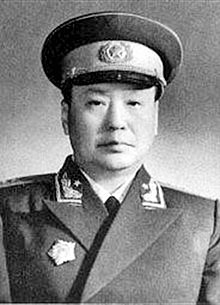Ulanhu
| Ulanhu | |
|---|---|

Ulanhu in 1955
|
|
| 3rd Vice President of the People's Republic of China | |
|
In office 15 March 1983 – 15 March 1988 |
|
| President | Li Xiannian |
| Leader | Deng Xiaoping |
| Preceded by |
Dong Biwu (1975) vacant |
| Succeeded by | Wang Zhen |
| Personal details | |
| Born | 23 December 1906 Inner Mongolia, Qing Empire |
| Died | 8 December 1988 (aged 81) Beijing, China |
| Political party | Communist Party of China |
| Spouse(s) | Yun Liren |
| Alma mater | Moscow Sun Yat-sen University |
| Ulanhu | |||||||
| Chinese name | |||||||
|---|---|---|---|---|---|---|---|
| Traditional Chinese | |||||||
| Simplified Chinese | |||||||
| Literal meaning | red son (in Mongolian) | ||||||
|
|||||||
| Chinese name | |||||||
| Traditional Chinese | |||||||
| Simplified Chinese | |||||||
|
|||||||
| Mongolian name | |||||||
| Mongolian Cyrillic | Улаанхүү | ||||||
| Mongolian script | ᠤᠯᠠᠭᠠᠨᠬᠦᠦ | ||||||
|
|||||||
| Transcriptions | |
|---|---|
| Standard Mandarin | |
| Hanyu Pinyin | Wūlánfū |
| Transcriptions | |
|---|---|
| Standard Mandarin | |
| Hanyu Pinyin | Yún Zé |
| Transcriptions | |
|---|---|
| SASM/GNC | Ulaan Hüü |
Ulanhu (23 December 1906 – 8 December 1988), also known by his Chinese name Yun Ze, was the founding Chairman of China's Inner Mongolia Autonomous Region, serving from 1947 to 1966. Ulanhu had the nickname of "Mongolian King" during his political career. He served as Vice-Premier between 1956 and 1966. He was purged during the Cultural Revolution but later reinstated. Between 1983 and 1988 he held the office of Vice President of the People's Republic of China.
Ulanhu holds the distinction of being the highest-ranking minority official in PRC history, and became an icon of loyalty both to the Mongolian people and to the PRC. With the exception of the Cultural Revolution, his family dominated the politics of Inner Mongolia. His son Buhe served as Chairman of Inner Mongolia for a decade, and his granddaughter Bu Xiaolin was appointed to the same position in 2016.
Born in Tumed Left Banner, just outside the city of Hohhot, Ulanhu was the child of herders. He went to elementary school in his hometown, and went on to study at the Mongolian-Tibetan College of Beiping (now Beijing). He joined the Socialist Youth League of China (later renamed Communist Youth League) in 1924, intending to become communist revolutionary. In 1925, he joined the Communist Party of China and was sent to Moscow Sun Yat-sen University in the Soviet Union to study Marxism. In Moscow, Ulanhu shared a desk with Chiang Ching-kuo, the son of Chiang Kai-shek.
In 1929, when he returned from his studies, Ulanhu began organizing communist rallies in Mongolia, and was appointed a Committee Member of the CPC's West-Mongolia Working Committee. In 1931, Ulanhu was chosen to run the military and intelligence offices in Mongolia, serving in Ikh Juu League (now the city of Ordos). During the Second World War, Ulanhu led his forces to stop the Japanese from advancing towards Hohhot and led his officers to march to northern Shaanxi where he continued battling against the Japanese forces. In August 1941, he arrived at the revolutionary base of Yan'an to work on ethnic affairs.
...
Wikipedia
